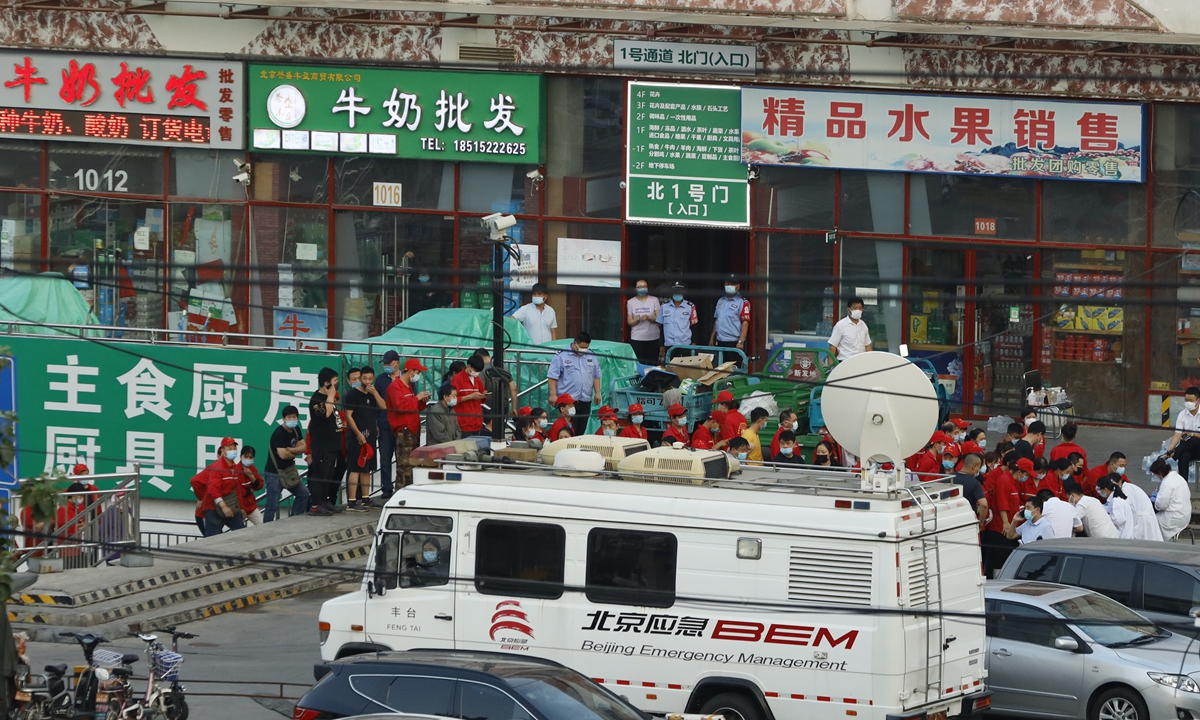Coronavirus detected on chopping board for imported salmon in Beijing market
Source:Global Times Published: 2020/6/12 17:13:49

Dealers at the Xinfadi market have their information registered on Friday. Beijing authorities shut down the market after new COVID-19 cases linked the market. Photo: Li Hao/GT
Beijing reported two new COVID-19 cases on Friday, a day after the city reported its first domestically transmitted case in eight weeks, raising concerns of a possible resurgence of the coronavirus in the Chinese capital city.
Local authorities are urged to maintain a "wartime" status to resolutely eliminate the possibility of a second outbreak, according to a Beijing COVID-19 prevention meeting chaired by Beijing Party Secretary Cai Qi.
Chinese health experts believe sporadic cases are normal as the epidemic has not ended, but a resurgence is unlikely as the capital's 20 million residents are deeply aware of precautions.
The two cases reported on Friday are colleagues from a meat research center in Beijing's Fengtai District, and they are receiving treatment at a designated hospital. One patient, surnamed Liu, had traveled to Qingdao, East China's Shandong Province for five days, while the other had no recent travel history, a Fengtai District official said at a press conference on Friday.
Fengtai District authorities are conducting an epidemiological investigation, and are collecting and testing samples from patients and the places they recently visited to trace the source of the virus. The residential communities where the two patients live have been put under closed management.
On Thursday, Xicheng District reported one new case. A Beijing local surnamed Tang has been sent to Beijing Ditan Hospital, a designated COVID-19 treatment center. Two close contacts, both of whom are the patient's family members, have been put under medical observation, the Beijing health authority announced at a press conference.
Later on Thursday night, COVID-19 nucleic acid test results of the two family members - one a fourth grade primary school students in Xicheng District - returned negative.
At Friday's press conference, Beijing health authorities released the results of Tang's epidemiological investigation, which showed he had visited several places, including a shopping mall, vegetable market and entertainment venues in Fengtai District.
Beijing immediately shut down the beef and lamb trade center of wholesaler Xinfadi Market and Jingshen sea food market in Fengtai District where Tang had visited. All relevant people including customers and meat dealers have undergone nucleic acid tests. In total, six major wholesale markets in Beijing suspended, or partially suspended, operations on Friday.
Novel coronavirus was detected on a chopping board for imported salmon at Xinfadi market, and nine related people have been put into quarantine even though their test results were negative, Zhang Yuxi, head of the Xinfadi market, told the Beijing News on Friday.
The imported salmon was from Jingshen seafood market, which was shut down on Friday.
Beijing will strengthen COVID-19 controls in the resumed catering industry, targeting meat and seafood markets, supermarkets, frozen meat warehouses and restaurants.
The Qingdao health commission ruled out the possibility that Liu was infected during his Qingdao trip, as Liu and Tang both visited the Xinfadi market. Tang went to the market to buy meat on June 3, while Liu collected samples of the market two days later, according to a statement published by the commission on Friday.
The meeting on COVID-19 prevention and control of Beijing on Thursday urged local authorities to strengthen inspection of imported meat and vegetables to prevent them from becoming the "invisible virus transmission route."
Beijing on Friday also changed its decision to reopen schools from first to third grades after the city reported new COVID-19 cases for two consecutive days.
Xu Hejian, a spokesperson of the Beijing municipal government, said at Friday's press conference that "the risks of epidemic exist, and we cannot tolerate any slack in regular prevention and control."
Regarding some residents' concerns of the possible resurgence of coronavirus in the capital, Wu Hao, the head of the Fangzhuang community health service center in Fengtai district and a professor at Capital Medical University told the Global Times on Friday that there is no need for residents to panic as sporadic cases like these are normal for China when the coronavirus epidemic has not completely ended.
For a city with over 20 million residents, Beijing has timely detected the cases following COVID-19 response protocol, and took necessary measures. The involved patients wore facial masks during the whole process at the hospitals, which shows that the precautions were widely and deeply promoted among local residents, Wu said, adding that this shows that it's very unlikely for the capital to experience a resurgence.
But residents should not put their guards down as "what could result in another outbreak is people's neglect of personal protections," Wu said.
He said stepping up citywide control measures won't be necessary for sporadic cases, and that precision management is enough.
Posted in: SOCIETY